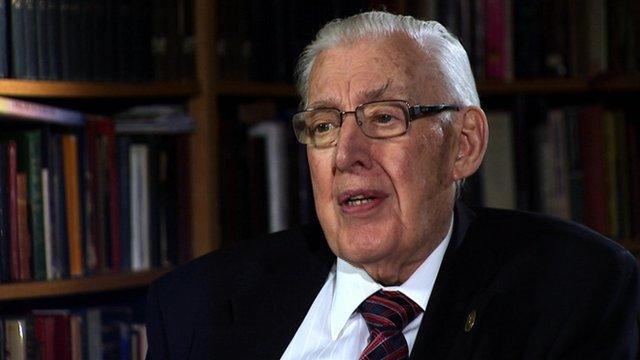Obituary: Ian Paisley
- Published
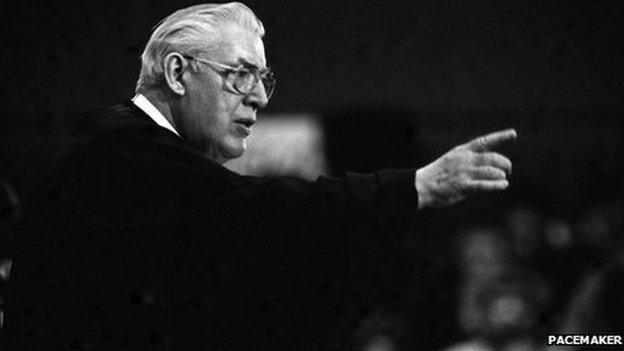
Mr Paisley was a preacher before he became involved in politics
Ian Paisley was famous for his thunder. He was known to his supporters as "the big man" whose most reported words were "no", "never" and "not an inch".
Yet in a political career that spanned nearly 40 years, he went from throwing snowballs at one Irish prime minister to embracing another one; from political "never man" to Northern Ireland's first minister.
He ended up leading a power-sharing executive at Stormont - although he had supported the strike to bring one down 30 years earlier.
His biggest turnaround came when, as the leader of hardline unionism, he sat down with Gerry Adams - his former bitter enemy, the leader of militant republicanism - as the Democratic Unionist Party and Sinn Fein decided to work together in an executive.
It seemed unimaginable to supporters who had followed him through years of protests that as Northern Ireland's first minister he would enjoy an easy relationship with his deputy first minister, Sinn Fein's Martin McGuinness, so much so that they became known as the "Chuckle Brothers".
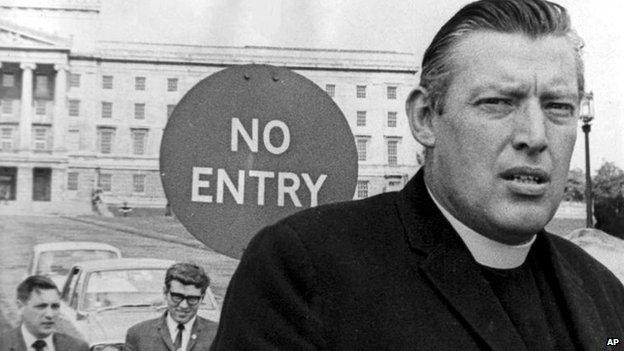
Ian Paisley pictured outside Stormont in 1969
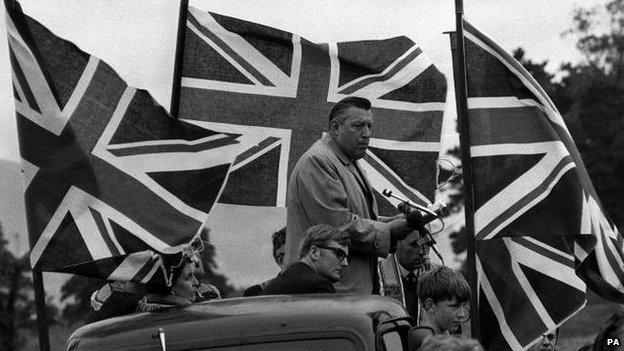
Ian Paisley pictured on 11 July 1970
With his thunderous rhetoric and his bull-like voice, Ian Paisley was always the epitome of an American Deep South preacher.
He was born in 1926 in Armagh. His father was a Baptist minister and his mother a preacher. He grew up in Ballymena, which was to become his political powerbase.
But before politics, he was a preacher, delivering his first sermon aged 16 in a mission hall in County Tyrone. He was just 25 years old when he founded the Free Presbyterian Church.
Prison sentence
His early reputation as a Protestant extremist was forged in the 1960s. He once produced a Roman Catholic Eucharist wafer during a televised speech to the Oxford Union mocking it and those who who believed it sacred.
When Irish Prime Minister Sean Lemass was invited to Belfast in 1965 by NI Prime Minister Terence O'Neill, Paisley was furious and led 1,000 loyalists to Stormont to demonstrate.
Two years later, he famously threw snowballs at another Irish Prime Minister, Jack Lynch, when he visited Northern Ireland.
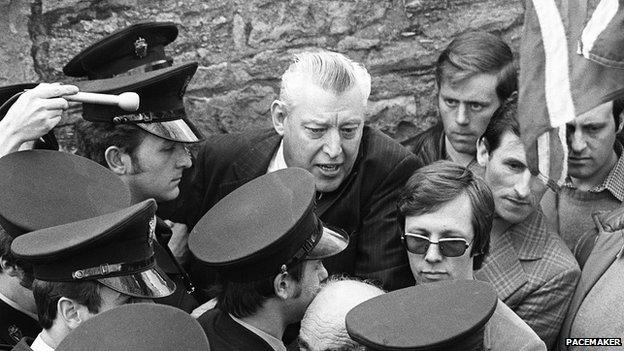
Mr Paisley, pictured being arrested in Armagh in 1980 at a protest against a visit by Taoiseach Charles Haughey
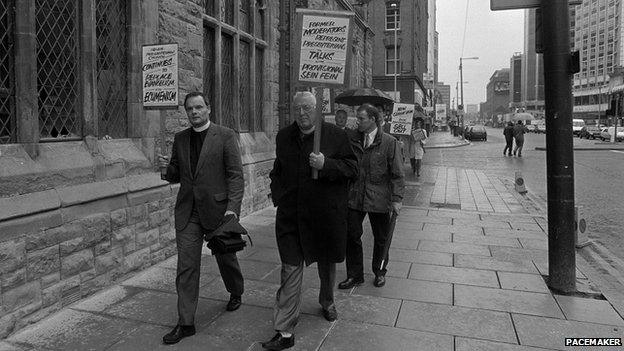
Mr Paisley, pictured in 1992 leading protest at start of Presbyterian General Assembly
He often took to the streets. He was sent to prison for six weeks for unlawful assembly when he organised a demonstration on 30 November 1968 and forced civil rights marchers to cut short their parade in the city of Armagh.
He was labelled a bullyboy. But thousands protested at his imprisonment, the membership of his church doubled and, on his release, he was greeted as a martyr.
He stood as a Protestant unionist and was elected to the Stormont Parliament in 1970. Two months later he took the North Antrim seat at Westminster.
.jpg)
Ian Paisley topped the poll in the 1979 European election
.jpg)
Ian Paisley with fellow MEP John Hume of the SDLP, pictured in 1999
It was said his maiden speech in the House of Commons could be heard in the Lords as well, and was received in almost complete silence.
By 1971, he had founded the Democratic Unionist Party (DUP) and he began a long battle with the Ulster Unionist Party (UUP) for the trust of the unionist electorate.
He opposed the formation of a power-sharing executive at Stormont in 1973 and became involved in the Ulster Workers Council strike that brought Northern Ireland to a standstill and led to the executive's collapse.
In 1979, in his first European election, he topped the poll. He may have been anti-European but won a reputation as a hardworking MEP who lobbied for all his constituents, regardless of their religion.
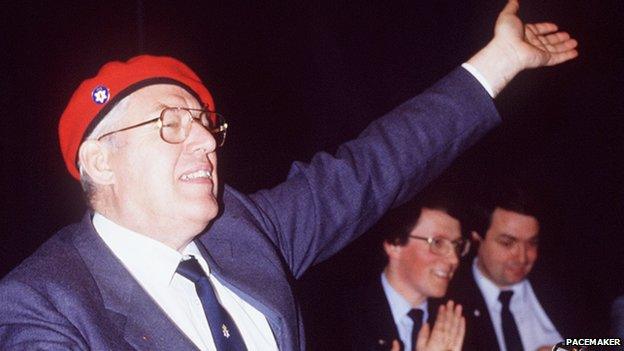
Mr Paisley, pictured with Peter Robinson at Ulster Resistance rally in 1986

Mr Paisley helped organise a so-called 'Third Force' in the early 1980s
Though he could be kindly and amusing in private, to his enemies and critics Ian Paisley was a sinister figure, a bigot and a dangerous presence.
They pointed to his involvement in Ulster Resistance. In 1981, he organised a demonstration of 500 men who paraded late at night on a County Antrim hillside, brandishing gun licences.

Ian Paisley and Jim Molyneaux at a rally opposing the Anglo-Irish Agreement

Mr Paisley resigned his Westminster seat in protest at the Anglo-Irish Agreement

Mr Paisley leaves Crumlin Road jail after spending two days in prison for non-payment of fines in protest at the Anglo-Irish Agreement
The signing of the Anglo-Irish Agreement in 1985 saw him join forces with the then Ulster Unionist leader James Molyneaux. Thousands attended a protest meeting under the banner "Ulster Says No" in Belfast city centre.
Together the two leaders adopted a policy of non co-operation, resigned their Westminster seats and forced by-elections which they later contested and won.
The move was not a universal success from the unionist viewpoint, as they lost the Newry and Armagh seat to the SDLP.
Good Friday Agreement
Ultimately the Molyneaux/Paisley relationship turned sour when it became clear the Ulster Unionists were willing to go to Dublin to talk to the Irish government while the DUP was not. Paisley famously called Molyneaux a "Judas Iscariot", a slight that hurt Molyneaux deeply.
He was totally opposed to the 1993 Downing Street Declaration between the British and Irish governments, and one meeting with John Major ended abruptly with the DUP being asked to leave.
The party was convinced a secret deal had been done to secure the 1994 IRA ceasefire.

Ian Paisley with UUP leader David Trimble at Drumcree in 1995
Paisley opposed the peace process from the beginning. He agreed to attend talks at Stormont in 1996, but when Sinn Fein was allowed in the following year, he walked out.
He came back on the night before Good Friday 1998 to register his disgust. The Good Friday Agreement brought Mr Paisley into a battle for votes with Molyneaux's successor as Ulster Unionist leader, David Trimble.
Three years earlier they had staged a triumphal march at Drumcree, leading Orangemen down the Garvaghy Road. Now they were facing up to each other.
The Yes camp won and, in a new assembly, the DUP was in the same political arena as Sinn Féin, even if they did not sit around a cabinet table together. Ian Paisley never hid his hatred of republicanism, but he did nominate two DUP ministers to a new executive.

Mr Paisley holds aloft the Good Friday Agreement booklet
When it was suspended and a new election loomed, the DUP overtook the Ulster Unionists at the polls.
Mr Paisley's hardline stance of "no surrender" and "not an inch" seemed gradually less sure in his final years as other parties inched towards accommodation.
He decided not to stand again for the European Parliament in 2004.
The election in the following year saw the DUP become the largest unionist party in Northern Ireland, displacing the Ulster Unionists who had dominated the unionist vote since partition.
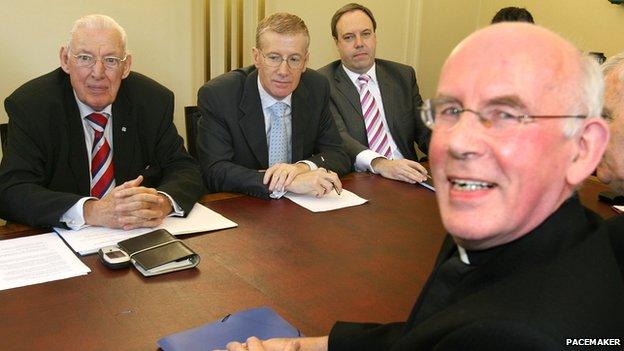
Mr Paisley led a DUP delegation to meet Catholic Archbishop Sean Brady
In his career, he launched countless attacks on Catholicism and Irish republicanism. He condemned the Pope and the Roman Catholic Church as "the whore of Babylon" and staged a one-man protest against the Pope when the pontiff addressed the Strasbourg Parliament in October 1988.
The leader of the Free Presbyterian Church denounced the pontiff as an "anti-Christ" and got bundled out of the chamber by scandalised colleagues.
However, he later astounded his critics by meeting the Irish Catholic Primate Sean Brady, external at Stormont in 2006.

In May 2007 Ian Paisley and the DUP agreed to share power with Sinn Fein

Ian Paisley and Martin McGuinness became first and deputy first ministers

The two men got on so well that they were nicknamed the 'Chuckle Brothers'
In May 2007, Ian Paisley became first minister, external of Northern Ireland with Sinn Fein's Martin McGuinness as the deputy first minister.
A year later, he stepped down from that role, handing over the reins, external to Peter Robinson, who also succeeded him as leader of the DUP.
In 2010, he took his seat in the House of Lords, where he was formally known as Lord Bannside of North Antrim.
Mr Paisley would subsequently claim that he was forced out by the party, blaming Mr Robinson and DUP MP Nigel Dodds for ousting him. Both men denied this.
He leaves a wife, Eileen, who is a baroness, and five children. Eileen was never far from his side and his favourite slogan at election time was: "Vote for my wife's husband".
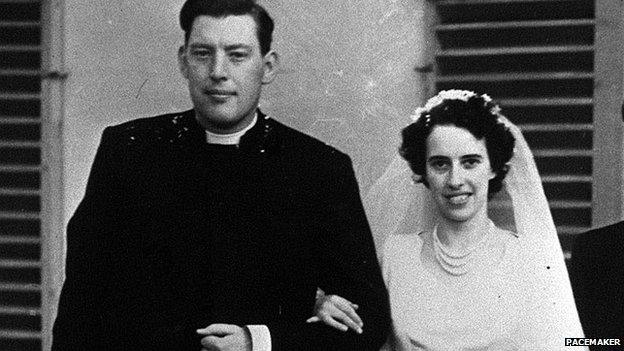
Ian and Eileen Paisley, pictured on their wedding day
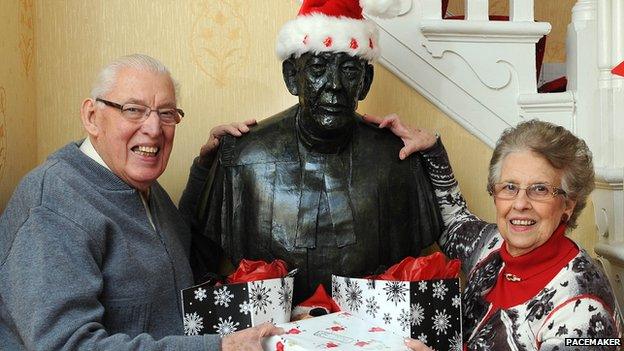
Ian and Eileen Paisley celebrate Christmas in 2010
The DUP remains the largest party in Northern Ireland and the dominant force in unionism.
Despite poor health and advancing years, he never lost his thunder.
Speaking about death during one of his sermons, he said: "If you hear in the press that Ian Paisley is dead, don't believe a word of it. I'll be more alive than ever… I'll be singing as I sang never before."
- Published12 September 2014
